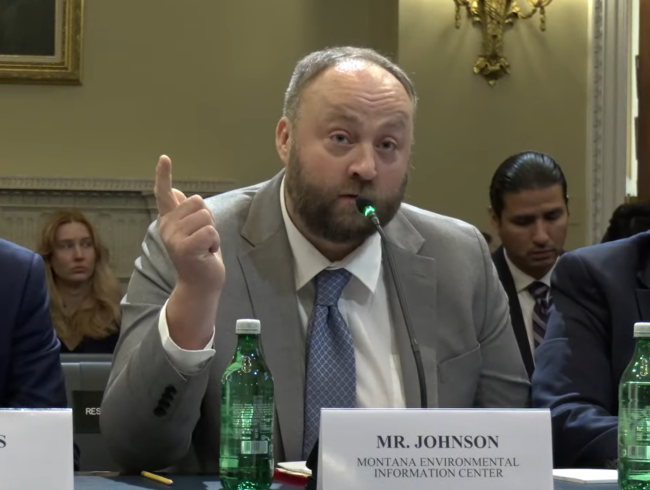
MEIC’s Derf Johnson testified in Congress about a standalone Signal Peak proposal in 2024.
by Derf Johnson
The Trump Administration and the new U.S. Senate and House majorities have made no secret of their disdain for environmental protections and their apathy in tackling climate change. Elections certainly have consequences, and our democracy and environment will be reeling from the people in authority for decades to come. Pres. Trump’s slough of Executive Orders (see article on previous page) and the administration’s rollback on environmental safeguards is unprecedented. Congress, not to be outdone, is now picking up speed and jumping into the fray with a series of proposals that would roll back a number of different public health and environmental safeguards.
If passed, many of these proposals would be devastating to environmental protections and public health. Rolling back environmental protections is incredibly unpopular amongst most Americans, and thus are unlikely to reach the 60-vote threshold required to surpass the filibuster in the U.S. Senate. Instead, Congress is attempting to bypass this requirement by stuffing many of these ideas into “reconciliation,” a budgeting process that was developed to expedite the passage of critical federal budget legislation. The process only requires a simple majority for its passage in the U.S. Senate, and so there are a smattering of different riders and amendments that the majority is attempting to sneak into the reconciliation package, including provisions on energy, environmental safeguards, toxic exposure, permitting provisions, sale of public lands, and fossil fuel development.
The reconciliation package is so bad that the ranking member of the House Natural Resources Committee Rep. Jared Huffman (D-California) characterized it to Politico as “cartoonishly destructive” and “worse than anything I could have imagined” for its absurd set of proposals. Relevant to Montana, the reconciliation package would seek to authorize a massive increase in destructive and polluting coal mining on public lands, give taxpayer handouts to coal mining companies, and legislatively mandate specific coal mining projects — including the expansion of the controversial Signal Peak / Bull Mountain Coal mine north of Billings —without having to follow the normal environmental review process.
The provisions in the House Natural Resources Committee include a requirement to force the leasing of four million acres of public lands to coal companies and for the federal Bureau of Land Management to approve this leasing regardless of the environmental review process. Another section seeks to reduce the royalty payments coal companies owe for the use of public lands for certain coal mining operations from 12.5% to 7%, which would dramatically reduce an important funding stream for state and local governments. The package would also allow for the Signal Peak coal mine — a company with an arms-length rap sheet of criminal and environmental violations — to mine federal coal by sidestepping the normal federal environmental review process.
While the full package has a long way to go before full passage in the House, the real bottleneck will be the vote in the U.S. Senate, where many of these provisions may be met with skepticism. MEIC encourages you to reach out to Montana’s Congressional delegation and tell them to vote no on these public lands and public health rollbacks.
This article was published in the June 2025 issue of Down To Earth.

